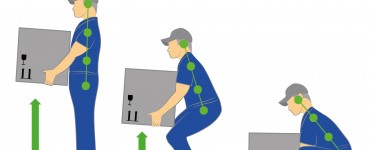Your health at work
 Are you fit for work? Musculoskeletal conditions (problems with the muscles, bones, joints and associated tissues) are a major contributing factor to work place absenteeism. The Office for National Statistics reports that 30.8 million working days are lost each year due to musculoskeletal issues, such as back, neck and upper limb pain, in the UK alone.
Are you fit for work? Musculoskeletal conditions (problems with the muscles, bones, joints and associated tissues) are a major contributing factor to work place absenteeism. The Office for National Statistics reports that 30.8 million working days are lost each year due to musculoskeletal issues, such as back, neck and upper limb pain, in the UK alone.
Habitual poor posture can contribute to daily aches and discomfort in the workplace and beyond. Whether you work at a desk or have a more manual occupation, your job may expose you to stresses and strains that can cause you pain.
Common causes of strain in the workplace can include:
- Prolonged sitting at a desk
- Driving long distances
- Awkward lifting and carrying
- Overstretching
- Bending
- Extended periods of repetitive motion
- Using a computer without taking breaks
These can lead to various aches and pains, and other common musculoskeletal conditions such as sciatica, carpal tunnel syndrome and tennis elbow. Furthermore, workplace stress can increase the amount of pain you feel by causing muscle tension and spasms.
Keeping healthy at work
These simple tips can keep you healthy at work and avoid unnecessary strain on your muscles and joints:
- Frequent short breaks away from the computer may help avoid back, neck and eye strain.
- Ensuring that your chair and computer display are appropriately adjusted so that the top of the screen is at eye level, may be more comfortable for your upper body and neck.
- When lifting, judge whether you can do this safely alone or need help (don’t be afraid to ask for assistance). Always keep the item you are lifting close to your body. Bend your knees and make your legs do the work. Try not to twist your back – turn with your feet
- When driving make sure you are positioned comfortably, and take regular breaks on long journeys, at least once every two hours.
How can your osteopath help?
Osteopaths are highly trained, healthcare professionals, experts in the musculoskeletal system (joints, muscles and associated tissues) and its relationship to other systems of the body. Osteopathic care is based on the individual needs of the patient and so varies depending on your age, fitness levels and diagnosis. Your osteopath can provide you with a fit note if you do need to take time off from work. You can discuss with your osteopath the impact work may have on your body and agree on an appropriate course of action that may help. Along with hands-on osteopathic treatment, your osteopath may also offer advice on posture, lifting and workplace ergonomics.


